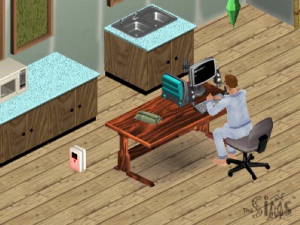Sunday 28 July 2002

|
Pic of the day: It's all about priority. Who needs painted walls when you have a computer? Worry and capitalismOur economy is based on people being too optimistic and too pessimistic. C.S. Lewis wrote in his "Screwtape letters" that human life moves in waves, because that's the closest it comes to perfection. This implies that stability is perfection. But I believe that most humans prefer the wave. Or rather they prefer the crest of the wave, and so they must also live with the trough. ***Be that as it may, the economy moves in waves. And not just the global economy or the national economy; no, the personal economy too. Even if we only have a regular salary, at least the bills will arrive in batches of random size, or so it seems. Some bills are monthly, some bi-monthly, some quarterly, and some only once; and many of the recurring bills vary in size from one month to the next. If your income varies too, this only adds to the chaos. When expenses exceed income, people worry. It is an unpleasant feeling, and their thoughts return again and again to the problem. Often they will think of some way to solve the problem: Working overtime or getting a side job, postponing a bill or borrowing money elsewhere. They will also decide on ways to keep this from happening again. Often as not this centers on earning more money somehow. Life moves on, and it still does so in waves. The bills become scarce for a while, and any new sources of income kick in. We approach the top of the wave. And now we see a new side of human inventiveness: The needs come marching in! The exact needs will vary. The poor may need a bike, the rich may need a mansion. But everyone needs something. And now that they have the money, they can fulfill their needs. (Or at least some of their needs.) Often as not the purchase also incurs running expenses. And then the bills return. And they are bigger than before, and there are more of them. And we just spent the cash! It's time for worry. And with it, new ideas and new resolves. ***If you recognize yourself in this description, rest assured that it is not just you. In fact, this behavior is so normal that it provides the foundation for the capitalist system as we know it. It has all the benefits of feudalism without its drawbacks. Now people will actively search out the places where their skills are in the highest demand. And they will work more and more. This trend can clearly be seen in North America as well as here in Europe. People don't work less when they earn more; instead they spend more and work even more. I do some of this myself, actually. But I try to be careful about buying stuff that has a running cost. And I have found that using a Net bank makes it easier to keep track of expenses; your mileage may vary. Having a credit card or a small amount of slosh money can allow you to even out the bills – you pay a steady sum into the credit card or slosh fund and pay your variable bills out of it. If, over time, the bottom becomes visible, then obviously we have a structural problem. If money keeps building up, I'm sure most people will find a way to handle that problem... Since you're reading this, chances are you have a computer. If that computer is able to play The Sims, a people simulator, you have the option of trying out various strategies for yourself on electronic people. It can be quite an educating experience. I've found that Sims earning little and having lots of free time are the most happy. I haven't taken this quite that far in my own life – I haven't quit my job, but that's largely because I cannot live by painting or carving like the Sims can. But I am working less than I did a few years ago, and it is quite possible that I will continue along this path. I am not sure others would be happy doing that, though. It depends on your memory, perhaps. Most people have a selective memory that gradually forgets the unpleasant things and retains the nice. This can easily be checked by thinking of your childhood. Was it a happy, carefree time? If so, you have the filter in place; real childhood isn't like that. If you remember childhood as a confusing, humiliating time, then you have a realistic memory. In that case, you will want to "even out" your economy, so as to stabilize on a comfortable standard of living. But if you have a selective memory, then you will want to maximize the wave amplitude, because you are going to remember the thrilling highs and forget the scary lows. And in the process, you will continue to uphold the Consumer Society. I want y'all to know that my mention of C.S. Lewis and the human wave function happened hours before I looked up my "2 years ago" entry and found that I have mentioned it there. Things like these happen with disconcerting frequency, giving credence to the highly improbable theory that the subconscious keeps remembering trivial details almost without limits. And no, I don't mention Lewis all that often; he is a good writer but I disagree with some of his theology. |
There was probably weather today. I did not notice. |
Yesterday <-- This month --> Tomorrow?